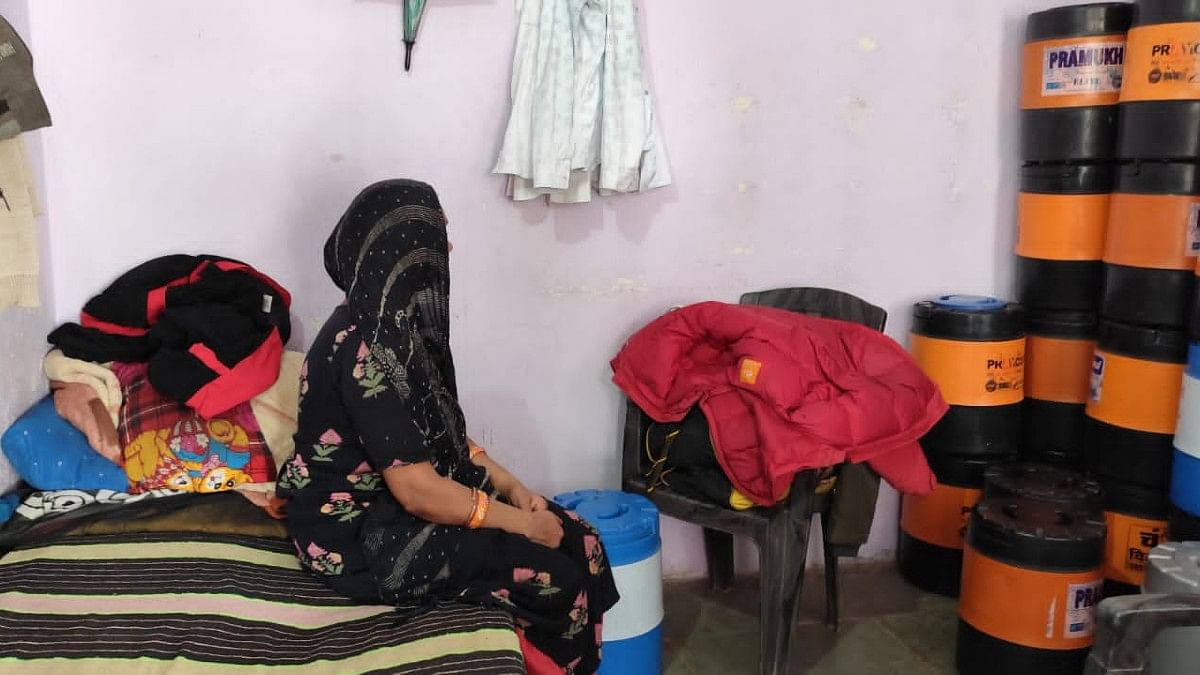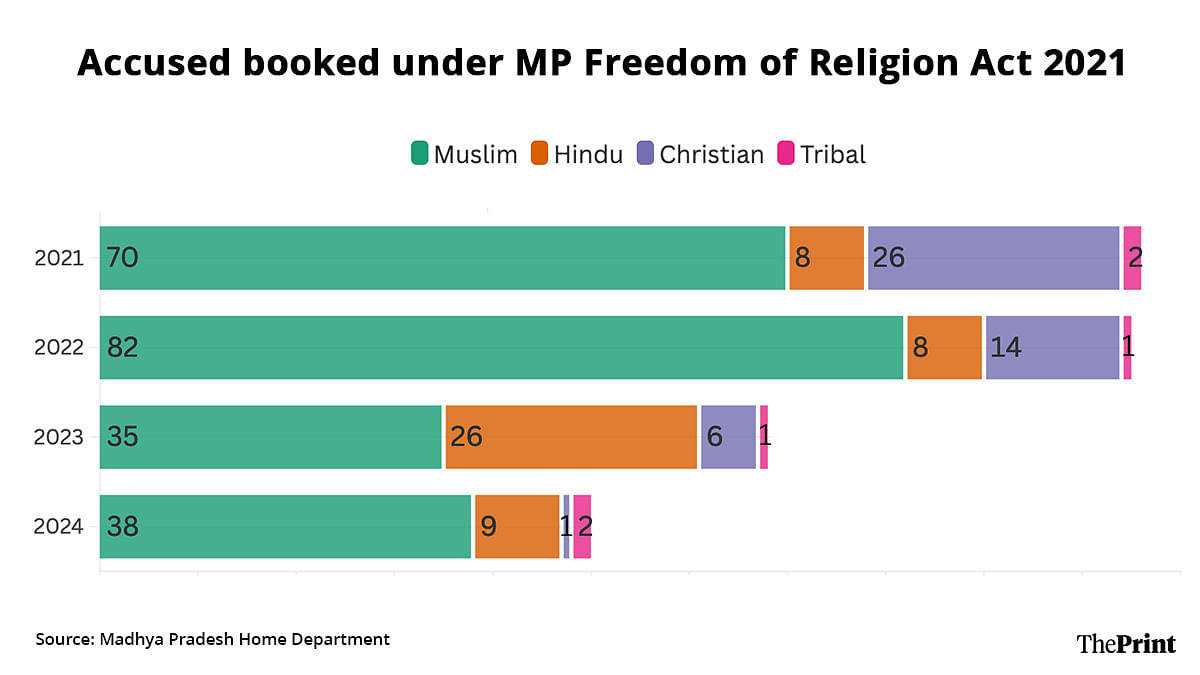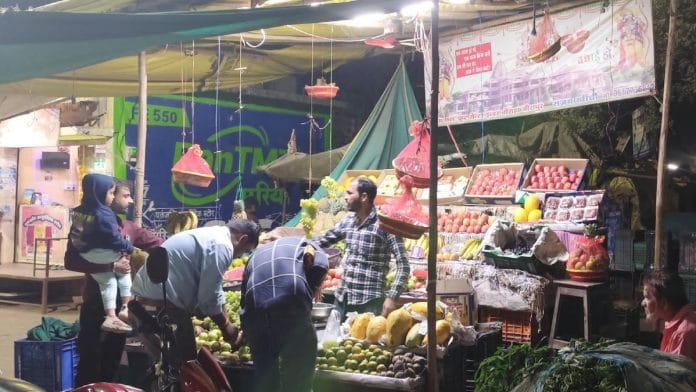Jirapur, Rajgarh: Dilip Khatik, a 40-year-old fruit seller, deftly manages a steady stream of customers at his fruit stall in Jirapur tehsil on the Rajasthan-Madhya Pradesh border as he awaits trial on charges of forced conversion.
Khatik, a lean man with a slight beard and a calm demeanor, is out on bail after his wife of 18 years, Asha, accused him of coercing her and their children to convert to Islam. The couple had been married since 2004 and were raising their three sons together when Asha made the accusation in March 2023. Soon after her complaint at the Jirapur police station, members of the Bajrang Dal intervened, leading to an FIR and Khatik’s subsequent arrest.
He spent two weeks in jail before getting bail after his 16-year-old son submitted an affidavit in court countering his mother’s claims.
“My husband became a liquor addict. My sister-in-law took him to a self-styled godman to get rid of his addiction. Dilip became sober but began praying five times a day and forcing our children to pray too,” said Asha, who has moved with two of her sons to her mother’s house in Rajgarh, about 20 km from Jirapur.
“I observed a fast and prayed too initially. But then he began giving away a substantial portion of his earnings to the healer, which is when I returned to my mother’s home.”

Khatik denies Asha’s accusation of forced conversion. “Nothing has changed. I continue to practise the religion that I was born in,” he said, standing in his shop with a banner of the Ram Temple in Ayodhya behind him. “She fabricated the story to get me out of the way because she was having an affair with another man,” he alleged.
Asha rejects the allegation of adultery.
Khatik is one of 51 Hindus in Madhya Pradesh who have been booked in 19 FIRs under the Madhya Pradesh Freedom of Religion Act, 2021, commonly known as the anti-conversion law, which is aimed at preventing conversion through the use of allurement, misrepresentation, fraud or marriage.
Although ostensibly intended to curb forced religious conversions, the law has in practice been increasingly misused in domestic disputes across the state of Madhya Pradesh. In many cases, the victim and accused belonged to the same religion or caste and had been married for years before the accusations of forced conversion.
According to Madhya Pradesh Home Department data, between 2021 and 2024, a total of 329 people were booked in 216 cases under the Freedom of Religion Act 2021.
ThePrint’s analysis of the cases based on the last names of the accused showed that while 51 cases involved Hindus, 225 were Muslims, 47 were Christians and six were tribals.

Indore, the financial capital of Madhya Pradesh, reported the highest number of FIRs at 65 followed by Bhopal, the state’s capital, with 15 cases. Experts say Indore’s record of 65 cases in the past four years is clear evidence of a growing vigilante culture in the district.
The study of FIRs revealed a pattern where sections of the anti-conversion law were invoked in cases involving sexual abuse, marital disputes or eve-teasing, among other issues. In some cases, the accused were acquitted by the court while in others the police were compelled to quash the FIR after allegations levelled by the victim’s family in the initial complaint could not be substantiated. Since its inception, the anti-conversion law has been contentious with legal experts and lawyers warning against its misuse.
“The anti-conversion act of Madhya Pradesh, far from its stated purpose of curbing forced conversions, is being used in cases of marital disputes, and invoked along with sections of the dowry act and sexual offences to further bolster cases,” said Nikita Sonaware, a Bhopal-based lawyer and co-founder of Criminal Justice and Police Accountability Project.
Authorities, however, defend the law’s implementation, saying due process is followed in all cases. “Our main focus is always to ensure that the victim is heard and a case is registered as per the victim’s complaint irrespective of their background,” Special Director General (Women Safety) Pragya Richa Shrivastava told ThePrint.
Also Read: Arya Samaj weddings are in trouble. Courts cracking down on certificates, conversions
Acquittals and retractions
In case after case, the story is similar.
In Madhya Pradesh’s Barwani district, 350 km south of Jirapur, Neha Balai, a member of the Scheduled Caste community, accused her husband, Sanjay Jain and three of his family members, in April 2022 of forcing her to embrace Jainism and pressuring her for dowry.
Months after her marriage, Neha lodged an FIR at Barwani’s Rajpur police station, accusing her husband and his family members of mistreating her for belonging to the Scheduled Caste community, pressuring her to embrace Jainism and demanding a dowry of Rs 5 lakh.
On 31 October 2023, after 19 months and 21 hearings, a special court in Barwani district acquitted Sanjay and others of all charges, saying the police investigation had failed to provide any evidence to back Neha’s allegations.
Today, the couple have reconciled and live together in Barwani with their children.
In another case registered on 6 January 2024, Rahul Khatik, a 22-year-old resident of Jirapur, accused his 20-year-old cousin Rajesh Khatik, of converting to Islam and using threats and financial inducements to coerce him into doing the same. Based on Rahul’s complaint, Rajesh was arrested and jailed.
After a year-long trial, a court acquitted Rajesh in January 2025 after Rahul and two witnesses, including their uncle, retracted their statements.
“The complainant accepted that he had a verbal spat with accused Rajesh Khatik owing to an ongoing property dispute,” the sessions court said in its ruling.
“Rahul, despite his initial FIR, refused to accept in court that Rajesh Khatik used allurement or force to convert them. Along with this, two other witnesses also turned hostile, due to which Rajesh Khatik was acquitted owing to lack of evidence.”
Misuse of law against Muslims and Christians
For Madhya Pradesh, a law prohibiting forced and fraudulent conversion is not new.
The Dharam Swatantra Adhiniyam Act 1968 was in force in the state before the Bharatiya Janata Party (BJP) introduced the Madhya Pradesh Freedom of Religion Ordinance 2020 when it returned to power in 2020 for a fourth term after toppling the 15-month Congress government.
The aim was to introduce a new law with a broader definition of fraudulent conversion and have stringent punishment.
“The anti-conversion law is an old law which witnessed some amendments in 2020, but the campaign gained steam post-2020 courtesy Shivraj Singh Chouhan who encouraged it to reconsolidate his position with the hardliners, especially the fringe groups,” Congress leader and Rajya Sabha MP Vivek Tankha told ThePrint.
The new anti-conversion law was passed in the Vidhan Sabha in 2021 amid chants of ‘Jai Shree Ram’. The then home minister, Narottam Mishra, said, “We will oppose any love that leads to jihad. Any love that makes our daughters and sisters suffer, we will oppose it.”
But experts say the law is being misused to intimidate minority communities.
“The laws were to checkmate and proscribe conversion but what I find today is that it has become and is being used as a weapon to scare or subdue minority communities with frivolous cases slapped against them,” said Tankha, who is also a lawyer. “Madhya Pradesh is one such laboratory of the BJP… It is a sorry state of affairs where in so many matters, the higher courts have intervened to grant relief and protect the victims.”
Of the 329 people booked under the law, 126 cases involve 225 Muslim accused, the highest among all groups. However, most of these cases have yet to result in convictions, with some being moved for quashing.
In Bhopal’s Awadhpuri, for example, police registered a case under the anti-conversion act against a Muslim named Badshah Khan after Mohan Singh Yadav, father of 20-year-old Kadambani Yadav, accused Badhshah of pressuring his daughter to convert.
Badshah and Kadambani Yadav had been neighbours and childhood friends, but after Kadambani’s parents tried to get her married, she eloped with Badshah. Following Mohan Yadav’s FIR, police reached Badshah’s house and the two were asked to return home.
“When we got the woman to the police station, despite two days of counselling, she refuted the allegations of her being pressured to convert,” the investigating officer of the case, Shiv Babu Tripathi, told ThePrint. “The woman’s father had shown pictures of Arabic scriptures but failed to produce the original when asked as evidence of conversion. Ultimately, we had to move the case for quashing the FIR.”
In another case, a 16-year-old Muslim boy was booked under the anti-conversion law for forcefully making a Hindu girl wear a burkha and taking her around Mandu in Dhar district on his motorcycle.
In Indore’s Betma police station, Sameer Khan along with Mahendra Solanki was booked for raping a Hindu woman. In Khan’s case, in addition to the rape charge, he was also booked under the anti-conversion law, with allegations that he tried to forcibly convert the sexual abuse victim. “The minor and her mother turned hostile on the accusations of conversion, and sexual assault levied against Sameer, which led to his bail. The matter is up for its final hearing and we are hopeful of getting an acquittal soon,” said Rajat Raghuvanshi, who secured bail for Sameer from the Madhya Pradesh High Court.
Advocate Shashank Shekhar, practising at the Jabalpur High Court, highlighted two separate cases involving children where the police registered cases of trafficking and invoked the anti-conversion law following complaints from Priyank Kanoongo, chairman of the National Commission for Protection of Child Rights.
“The 17-year-old boy, a Christian staying in a Bible College, was found during one of these sudden inspections by Mr Kanoongo and that became the basis for the FIR,” said Shekhar.
“When the anti-conversion law clearly demands it is only the victims, blood relatives or guardians who can register a complaint under this law, then how are these FIRs being registered on the complaint of a third party,” he asked.
Validity of law challenged in courts
The controversial anti-conversion law has faced pushback from both the High Court and the Supreme Court following the filing of a Public Interest Litigation (PIL) in the Madhya Pradesh High Court. Amratansh Nema, a law student from Madhya Pradesh, filed the PIL challenging several provisions of the anti-conversion law.
These include Section 2(1)(c), which defines “conversion”; Section 4, which allows not only the victim but also their relatives—parents, siblings, or any person connected by blood, marriage or adoption—to file a complaint; Section 10, which requires individuals to submit a declaration and obtain prior approval from the district administration 60 days before conversion; and Section 12, which shifts the burden of proof onto the accused rather than the prosecution.
The Madhya Pradesh High Court halted the implementation of section 10, calling it unconstitutional, a decision later upheld by the Supreme Court.
Still, the police continue to apply other sections of the act.
Despite occasional reprimands from the courts and the withdrawal of FIRs, cases continue to be registered under the act unchecked.
In one of the most recent cases, a young interfaith couple from Narmadapuram, who had travelled to Bhopal for a court marriage, was intercepted by right-wing groups. The Muslim man, identified as Sayyed Khan, was beaten and handed over to the police by members of these groups.
“The law is not only misused but also has a chilling effect on interfaith couples as a man trying to marry a woman from a different religion faces up to 10 years of imprisonment, essentially putting him in the bracket of heinous crimes,” Sonwane told ThePrint.
“There need to be effective mechanisms to safeguard citizens from the misuse of such laws.”
(Edited by Sugita Katyal)
Also Read: Heftier fines, tougher bail, life term — new bill seeks to make UP’s anti-conversion law more strict







No wonder the highest number of accused under this law are Muslims.
Islam’s inherent bias against and contempt for other religions is the crux of the matter. A Muslim trying to proselytize does not think of his actions as contrary to secular ethos. Rather he thinks he is doing a favour to the targeted person and a good deed which will earn him a place in Jannat.
A Muslim man/boy “falls in love” with a woman/girl from another religion knowing well enough that she practises a different religion. What explains this urge or necessity to convert the woman to Islam?
Instead of.condeming the narrow mindedness of Islam and it’s patently bigoted attitude towards other religions, Ms. Siddique tries to find issues with the law.